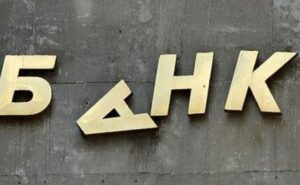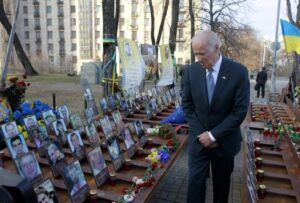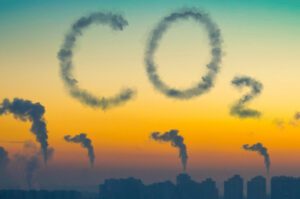
The National Bank of Ukraine (NBU) on September 9 made a decision to revoke the banking license and liquidate Bank Zemelny Capital (Dnipro) belonged to former Coal Industry Minister Viktor Topolov (94.4% of shares), the regulator has said on its website.
“At the suggestion of the Deposit Guarantee Fund, the NBU made decision No. 469-rsh dated September 9, 2021 to revoke the banking license and liquidate Bank Zemelny Capital,” the NBU said.
As reported, the NBU on August 11 classified Bank Zemelny Capital as insolvent due to the failure to meet its obligations to depositors and other creditors due to insufficient funds within the term established by the agreement or determined by the legislation of Ukraine.
Bank Zemelny Capital was founded in 1994. According to the NBU data as of January 1, 2021, the owner of the bank’s substantial participation is former Minister of the Coal Industry Viktor Topolov (94.4% of the shares).
According to the NBU, as of June 1, 2021, Bank Zemelny Capital ranked 63rd in terms of total assets (UAH 909.983 million) among 73 banks operating in the country.

The adoption of a bill on public health protection from tobacco exposure alone with earlier rejected and repeatedly submitted proposals for the second reading, such as a ban on the display of tobacco products at sales outlets, would increase counterfeiting, the European Business Association (EBA) has said on its website.
The association said that on July 13, 2021, at the sitting of the Verkhovna Rada Committee, it was unanimously decided to recommend the wording of bill No. 4358 on amendments to certain laws of Ukraine on public health protection from tobacco exposure of November 10, 2020, for adoption at the first and final reading by Verkhovna Rada. The EBA has repeatedly submitted proposals for bill No. 4358 and the comments were partially taken into account.
“According to the information received in the working order, some MPs-initiators of the amendments to bill No. 4358, which had been rejected by the Verkhovna Rada Committee, announced their intention to initiate discussion of such amendments during the voting of bill No. 4358 in the second reading,” the association said.
These include amendments on banning the display of tobacco products at sales outlets, as well as amendments on introducing a standardized pack for cigarettes.
“Business urges MPs to implement the requirements of Directive 2014/40/EU of the European Parliament and of the Council of 3 April 2014 without excessive regulatory burden,” the EBA said.

NJSC Naftogaz Ukrainy plans to end 2021 with a net profit, CEO Yuriy Vitrenko has said.
“We are doing everything to show that, in the results of this year, Naftogaz is no longer a loss-making company and is financially stable,” he told Interfax-Ukraine on the sidelines of the YES Brainstorming 2021 forum in Kyiv on Friday.
Vitrenko recalled that the stability of Naftogaz largely depends on the solvency and financial discipline of its counterparties to whom it sells natural gas: thermal energy enterprises, industrial and household consumers.
In addition, the financial activities of Naftogaz are also influenced by the results of Gas Transmission System Operator of Ukraine (GTSOU), on which the dynamic payments of Mahistralni Gazoprovody Ukrainy (MGU) for the infrastructure transferred at the end of 2019 depend.
“The situation when a critical element of the infrastructure – GTSOU – incurs losses that are not replenished, for example, due to unauthorized selections or nonpayment for balancing services, is not normal,” Vitrenko said.
“Naftogaz has enormous problems associated with the fact that the entire industrial chain was financially unstable. Our task is precisely to make sure that, on the one hand, the entire market can develop financially sustainably, and on the other hand, Naftogaz is a financially stable company. which can increase production and really ensure, and not at the level of declarations, the country’s energy security,” he said.

United States President Joe Biden will visit Ukraine, but not this year, Foreign Minister Dmytro Kuleba said.
“I have no doubt that President Biden will fly to the middle of the Dnipro River, and cross the Dnipro River, and land in Boryspil, and arrive in Kyiv. But this visit will not take place this year, since diplomatic practice does not provide for an exchange of visits of this level in one year,” Kuleba said in the Details of the Week (Podrobytsi Tyzhnia) program on the Inter television channel on Sunday evening.
The minister noted that for now, the parties would focus on the implementation of the agreements that were reached during Ukrainian President Volodymyr Zelensky’s visit to the U.S.
Ukrainian diplomats are working on preparations for U.S. President Biden’s visit to Ukraine, Kuleba earlier said.
Biden last visited Ukraine in January 2017 as U.S. vice president. During his visit, he took part in bilateral meetings with the fifth Ukrainian president, Petro Poroshenko, and Volodymyr Groysman, who has been head of the government at the time.

Shifting the burden of financing decarbonization onto taxpayers would be wrong, Ambassador of the European Union (EU) to Ukraine Matti Maasikas expressed this position at the discussion titled “Decarbonization. What is the Ukrainian way?”
“The polluter must pay. The authorities must work more boldly with this,” the ambassador said.
According to him, the payment for CO2 emissions is EUR 0,15 per tonne in Ukraine, while over EUR 50 in the EU.
First Deputy CEO of Interpipe Denys Morozov said that business is ready to invest in decarbonization, but with the support of the government, these efforts will have a greater effect. Morozov said the company made the largest environmental investment of about $1 billion without government support ten years ago, when no one spoke about Green Deal, having built an innovative electric steel-smelting complex Interpipe Steel instead of the environmentally dirty open-hearth production and reducing CO2 emissions by ten times.
According to him, Interpipe, which exports 85% of its products, is increasingly receiving requests for environmental audits from its customers, and now the company is completing the development of a long-term Decarbonization Strategy.
“Despite the presence of a modern metallurgical plant that meets all EU environmental standards, we still need support from the government. First of all, it concerns the availability of scrap metal, which is a critical raw material for decarbonization,” Morozov said. He called for leaving all scrap in Ukraine, since without it the country will not be able to decarbonize metallurgy and achieve the goals of the Green Deal.
The second problem, he called the lack of sufficient industrial access to cheap low-carbon and “green” electricity, in particular, nuclear power plants.
DTEK Executive Director Dmytro Sakharuk said the main requirement for the state is predictability.
“Long-term investments need a stable environment […]. We are ready to pay, but we need trust [in the actions of the authorities] and stability,” he said.
According to Sakharuk, the reduction of feed-in tariffs resulted in almost 1 GW of green electricity not being generated in 2021 and an additional 2 million tonnes of CO2 will be emitted.
Deputy Prime Minister for European and Euro-Atlantic Integration Olha Stefanishyna said it is important for business to get a strategy and the government is working on its own Ukrainian Green Deal.
She said there is a clear understanding of the need for financial resources for such a green transition, and this is also one of the government’s priorities.
According to Minister of Environmental Protection and Natural Resources Roman Abramovsky, Ukraine has already managed to agree on the idea of a Ukrainian Climate Fund, similar to the Energy Efficiency Fund, with the European Bank for Reconstruction and Development (EBRD), and by the end of September such an agreement can be completed with the World Bank.
According to Morozov and Sakharuk, one of the directions for using the fund’s resources could be compensation for interest rates, since in Ukraine they are significantly higher than in Europe. As the head of the Ecology Ministry said, it is possible.

Uzhgorod International Airport received its first flight on Friday in accordance with the intergovernmental agreement signed between Ukraine and Slovakia in September 2020.
According to the press service of the Ministry of Infrastructure of Ukraine, now air traffic control, as well as the use of airspace at a tactical level, will take place in a certain part of the airspace of Slovakia. Non-precision instrument approach procedures will be applied at the Uzhgorod aerodrome.
The ministry said that this agreement was necessary due to the fact that this airport is located in a mountainous area in such a way that the threshold of runway 10 is located a few hundred meters from the Ukrainian-Slovak border. Therefore, the use of the airspace of a neighboring country is a prerequisite for instrument landings at this airfield.
“From today, the possibilities of using the airfield for airlines in Uzhgorod have been expanded. This is the result of Ukraine’s long-term work at the international level, and we expect that it will have a positive effect on the development of air transportation in the region. We see that there is a demand for both international and domestic flights. For example, flights on the route Kyiv – Uzhgorod – Kyiv, restored this summer, almost always take place with full load of seats,” Minister Oleksandr Kubrakov said.
UkSATSE, in turn, said that Ukraine’s ability to manage air traffic in part of the airspace of an EU member state is proved by an updated certificate that the state-owned enterprise received from the EU Aviation Safety Agency (EASA) on August 31, 2021.